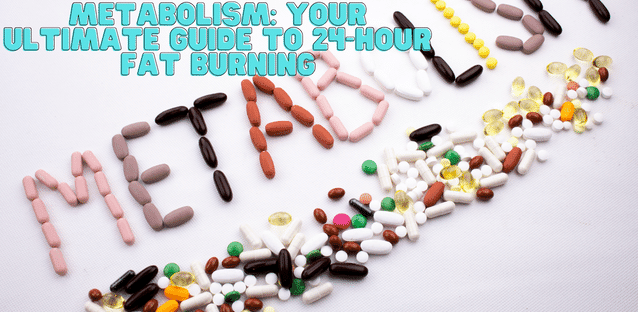HEALTH
Knowing Everything About Metabolism: Unveiling the Secrets to 24-Hour Fat Burning


Introduction
Welcome to Metabolism 101, where we unravel the intricate workings of our body’s energy powerhouse. In this comprehensive guide, we’ll explore the dynamics of metabolism and how understanding it can transform our bodies into efficient fat-burning machines. So, buckle up and pay attention to the science behind the process that keeps us going.
All About Energy
Our bodies are perpetual energy consumers, whether we’re sprinting, typing behind a screen, or even engaging in intimate moments. Energy is the fuel that powers every function, and our body’s ability to generate it is vital for survival. Let’s categorize these energy-consuming activities into automatic functions and voluntary actions, shedding light on the complexity of our energy needs.
Automatic Functions
These are the involuntary tasks our body performs, such as heartbeat, eye twitches, and the internal workings of organs like the liver and kidneys. While we have no direct control over these functions, our dietary and lifestyle choices can influence the energy expended on them, a crucial aspect we’ll delve into later in the guide.
Voluntary Actions
Every action we choose to undertake, from walking the dog to fetching a glass of milk, requires a certain level of energy expenditure. These voluntary actions collectively contribute to our daily calorie burn.
Understanding the Caloric Unit


Knowing Everything About Metabolism
The metric that quantifies our energy intake and expenditure is the calorie. Metabolism, defined as the caloric sum of both automatic and voluntary functions, orchestrates the energy-forming process within our bodies.
The Four Pillars of Metabolism
Metabolism is not a monolithic entity but comprises four distinct parts, each playing a crucial role in our overall energy balance.
- Resting Metabolic Rate (RMR): The powerhouse of metabolism, RMR accounts for over 75% of our daily calorie expenditure. Enhancements here can translate into significant fat loss over time.
- Thermal Effect of Feeding (TEF): This component represents the calories expended on storing, digesting, and absorbing food.
- Thermal Effect of Activity (TEA): Within our control, TEA encompasses the calories burned during activities like cardio and strength training, potentially contributing up to 30% of our daily caloric expenditure.
- Adaptive Thermogenisis (AT): The adaptive nature of metabolism, influenced by environmental factors like temperature and mental state, can be harnessed to boost fat-burning benefits.
Making Allies Out of Enemies
Often perceived as adversaries in our quest for health and aesthetics, these four pillars can become valuable allies. By understanding and optimizing each component, we unlock the secrets to burning fat 24 hours a day. The efforts invested in this pursuit yield results that far surpass the initial endeavor.
Conclusion
In conclusion, knowing everything about metabolism empowers us to make informed choices that positively impact our health and fitness journey. By turning the pillars of metabolism into allies, we pave the way for a 24-hour fat-burning experience that transcends the initial effort.
FAQs
Q: Can I boost my metabolism naturally? Absolutely. Engage in regular physical activity, prioritize strength training, and ensure a balanced diet to enhance metabolism naturally.
Q: Does metabolism slow with age? Yes, metabolism tends to slow with age due to a decline in muscle mass. However, lifestyle factors play a significant role in mitigating this effect.
Q: Are there foods that increase metabolism? Certain foods, like spicy ones and those rich in protein, can temporarily boost metabolism. However, sustainable effects require a comprehensive approach.
Q: Can stress affect metabolism? Yes, stress can influence metabolism through the activation of adaptive thermogenesis. Managing stress is crucial for overall metabolic health.
Q: Is fasting beneficial for metabolism? Intermittent fasting can have positive effects on metabolism, promoting fat loss and improving metabolic flexibility.
Q: How can I maintain a healthy metabolism in the long term? Consistency is key. Adopt a balanced diet, stay physically active, prioritize strength training, and manage stress for sustained metabolic health.

